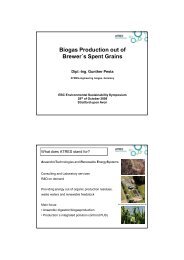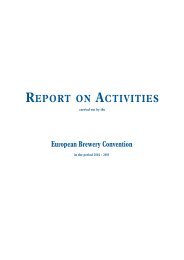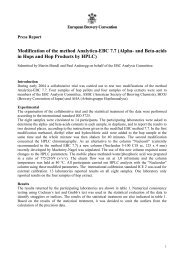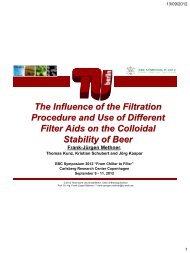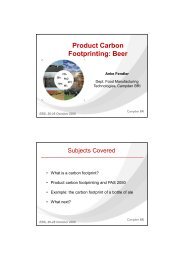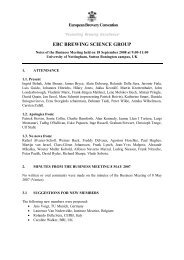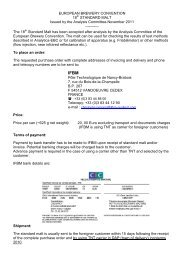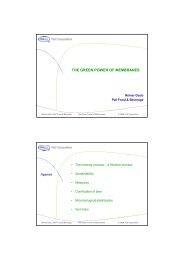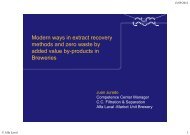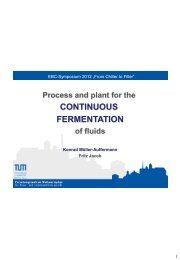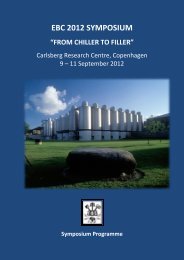Sustainability of Beer Filtration - European Brewery Convention
Sustainability of Beer Filtration - European Brewery Convention
Sustainability of Beer Filtration - European Brewery Convention
You also want an ePaper? Increase the reach of your titles
YUMPU automatically turns print PDFs into web optimized ePapers that Google loves.
<strong>Sustainability</strong> <strong>of</strong> <strong>Beer</strong> <strong>Filtration</strong><br />
<strong>Sustainability</strong> <strong>of</strong> <strong>Beer</strong> <strong>Filtration</strong><br />
1
<strong>Sustainability</strong> <strong>of</strong> <strong>Beer</strong> <strong>Filtration</strong><br />
Comparison <strong>of</strong> the<br />
currently used<br />
<strong>Filtration</strong> Methods<br />
Presentation at the EBC Symposium, 10. Sept. 2012<br />
by Juerg Zuber, MD FILTROX Engineering AG<br />
2
<strong>Sustainability</strong> <strong>of</strong> <strong>Beer</strong> <strong>Filtration</strong><br />
Agenda <strong>of</strong> the Presentation:<br />
- What is <strong>Sustainability</strong><br />
- <strong>Sustainability</strong> at FILTROX<br />
- Carbon Footprint <strong>of</strong> <strong>Beer</strong> Production<br />
- <strong>Filtration</strong> Systems today<br />
- Precoat <strong>Filtration</strong><br />
- Membrane <strong>Filtration</strong><br />
- System Comparison<br />
- Summary and Conclusion<br />
3
<strong>Sustainability</strong> <strong>of</strong> <strong>Beer</strong> <strong>Filtration</strong><br />
<strong>Sustainability</strong>:<br />
Since the 1980s, human<br />
sustainability has<br />
implied the integration<br />
<strong>of</strong> economic, social and<br />
environmental spheres<br />
to: “meet the needs <strong>of</strong><br />
the present without<br />
compromising the<br />
ability <strong>of</strong> future<br />
generations to meet<br />
their own needs.”<br />
4
<strong>Sustainability</strong> <strong>of</strong> <strong>Beer</strong> <strong>Filtration</strong><br />
<strong>Sustainability</strong> at FILTROX<br />
Water<br />
- We recycle almost 100% <strong>of</strong> our process water for the filter sheet production<br />
Energy<br />
- We have our own water power generation, which covers up to<br />
40% <strong>of</strong> our power consumption<br />
- We use propane gas for our drying oven<br />
Products<br />
- Our filters are made <strong>of</strong> stainless steel, which can be 100% recycled<br />
- Our consumables are made <strong>of</strong> cellulose (renewable) and DE (natural product)<br />
5
<strong>Sustainability</strong> <strong>of</strong> <strong>Beer</strong> <strong>Filtration</strong><br />
EcoPower Plant „Kraftwerk Burentobel AG“<br />
A Joint Venture<br />
between FILTROX AG,<br />
the City <strong>of</strong> St. Gallen<br />
and SN Energie AG<br />
Produces 1.2 Mio. kWH<br />
(approx. 40% <strong>of</strong> FILTROX<br />
consumption) using water<br />
from the nearby SITTER river<br />
Certified EcoPower<br />
6
<strong>Sustainability</strong> <strong>of</strong> <strong>Beer</strong> <strong>Filtration</strong><br />
Carbon Footprint <strong>of</strong> <strong>Beer</strong><br />
Production (NBB):<br />
Brewing Operations accounts<br />
for only 3.9% <strong>of</strong> the carbon<br />
footprint, if you look at the<br />
whole chain from raw material<br />
to the consumer.<br />
<strong>Filtration</strong> again is only a<br />
fraction <strong>of</strong> the brewing<br />
process regarding carbon<br />
footprint.<br />
7
<strong>Sustainability</strong> <strong>of</strong> <strong>Beer</strong> <strong>Filtration</strong><br />
<strong>Filtration</strong> Systems (1)<br />
• Precoat filtration<br />
- With plate and frame filters<br />
- With horizontal leaf filters<br />
- With candle filters<br />
• Filter aids<br />
– Kieselguhr (D.E.)<br />
– Perlite<br />
– Cellulose<br />
– Regenerable Polymers<br />
8
<strong>Sustainability</strong> <strong>of</strong> <strong>Beer</strong> <strong>Filtration</strong><br />
<strong>Filtration</strong> Systems (2)<br />
• Membrane Systems<br />
– With tubular membranes<br />
– With flat membranes<br />
– With rotating discs<br />
• Membranes<br />
– Polymer (PES, PA, Teflon…)<br />
– Ceramic (Al 2 O 3 , SiC, ZrO)<br />
– Metal (Stainless steel)<br />
9
<strong>Sustainability</strong> <strong>of</strong> <strong>Beer</strong> <strong>Filtration</strong><br />
Precoat <strong>Filtration</strong>: Basic flow-sheet<br />
Resources:<br />
- Filter aid<br />
- Energy (Pump)<br />
- Water<br />
- Caustic<br />
- Acid<br />
CIP<br />
Filter<br />
Aid<br />
CO 2<br />
<strong>Beer</strong> in<br />
<strong>Beer</strong> out<br />
CIP<br />
10
<strong>Sustainability</strong> <strong>of</strong> <strong>Beer</strong> <strong>Filtration</strong><br />
Precoat filtration: Filter Aids<br />
Kieselguhr (D.E.)<br />
- Natural Product (Shells <strong>of</strong> Diatomea) => limited resource<br />
- Mechanically processed and thermally treated<br />
(0.5 - 0.8 kWh/kg)<br />
- Disposal:<br />
- Farmers (Fertilizer, cattle feed mixed with spent grain)<br />
- Waste processing plants<br />
- Burning (together with spent grain)<br />
- Landfill<br />
- Why not back to the sea?<br />
11
<strong>Sustainability</strong> <strong>of</strong> <strong>Beer</strong> <strong>Filtration</strong><br />
Precoat filtration: Filter Aids<br />
Perlite<br />
- Natural Product (Mineral) => limited resource<br />
- Mechanically processed and thermally treated (0.5 kWh/kg)<br />
- Disposal:<br />
- Farmers (Fertilizer)<br />
- Waste processing plants<br />
- Burning (together with spent grain)<br />
- Landfill<br />
12
<strong>Sustainability</strong> <strong>of</strong> <strong>Beer</strong> <strong>Filtration</strong><br />
Precoat filtration: Filter Aids<br />
Cellulose<br />
- Natural Product (Wood pulp) => renewable!<br />
- Mechanically and chemically processed (3.3 kWh/kg!)<br />
- Disposal<br />
- Farmers (Cattle feed, fertilizer)<br />
- Waste processing plants<br />
- Burning (energy production)<br />
- Landfill<br />
13
<strong>Sustainability</strong> <strong>of</strong> <strong>Beer</strong> <strong>Filtration</strong><br />
Precoat filtration: Filter Aids<br />
Regenerable Polymers<br />
-Polyamide (IFT by AB-InBev)<br />
-Polystyrene/PVPP (Crosspure by BASF)<br />
- Synthetic products (oil based) => limited resource!<br />
- Mechanically and chemically processed (≈ 2.5 kWh/kg)<br />
- No disposal necessary<br />
14
<strong>Sustainability</strong> <strong>of</strong> <strong>Beer</strong> <strong>Filtration</strong><br />
Crosspure ® by BASF<br />
•New synthetic, regenerable filter aids<br />
•Compound (Mixture) <strong>of</strong> PVPP and Polystyrene<br />
•<strong>Filtration</strong> and Stabilization in one pass<br />
•Regeneration similar to PVPP-Regeneration<br />
• Industrial tests show good results on<br />
FILTROX candle filter<br />
•Economically competitive to D.E. <strong>Filtration</strong><br />
15
<strong>Sustainability</strong> <strong>of</strong> <strong>Beer</strong> <strong>Filtration</strong><br />
Crosspure ® from BASF<br />
Crosspure ® consists <strong>of</strong> two polymers used in the beverage<br />
and food industry for many years<br />
• Crosslinked PVP (PVPP) is known for its excellent<br />
stabilisation capabilities<br />
• Polystyrene is used and is approved for food contact<br />
(e.g. in plastic cups, food packaging)<br />
The two polymers are “combined”, using a patented<br />
compounding process reaching<br />
• a high mechanical stability<br />
• a high chemical stability<br />
Crosspure ® is regenerable<br />
causing < 1% losses<br />
similar to regeneration<br />
process with PVPP<br />
SEM <strong>of</strong><br />
Crosspure F<br />
Crosspure powder<br />
16
<strong>Sustainability</strong> <strong>of</strong> <strong>Beer</strong> <strong>Filtration</strong><br />
Crosspure ® - the Product<br />
70% Polystyrene, 30% PVPP<br />
17
Filtrate<br />
<strong>Sustainability</strong> <strong>of</strong> <strong>Beer</strong> <strong>Filtration</strong><br />
Membrane <strong>Filtration</strong>: Basic Flow Sheet<br />
Resources:<br />
- Membrane<br />
- Energy (Pumps)<br />
- Water<br />
- Caustic<br />
- Acid<br />
- Cleaning agent<br />
- Cooling<br />
Water<br />
Retentate<br />
F<br />
T<br />
Unfiltrate<br />
Batch<br />
tank<br />
C<br />
T<br />
CIP<br />
T<br />
T<br />
P<br />
T<br />
F<br />
T<br />
F<br />
T<br />
P<br />
T<br />
18
<strong>Sustainability</strong> <strong>of</strong> <strong>Beer</strong> <strong>Filtration</strong><br />
Membrane <strong>Filtration</strong>: Membranes<br />
Polymers<br />
- Synthetic product (oil based) => limited resource<br />
- Chemically and thermically processed (≈ 2.5 kWh/kg)<br />
- Lifetime 1.5 to 2 years only<br />
- Disposal through burning<br />
19
<strong>Sustainability</strong> <strong>of</strong> <strong>Beer</strong> <strong>Filtration</strong><br />
Membrane <strong>Filtration</strong>: Membranes<br />
Ceramic (Al 2 O 3 )<br />
- Very stable oxides (Minerals) => limited resources<br />
- Mechanically and thermically processed (0.65 kWh/kg)<br />
- Lifetime 8 to 10 years<br />
- No disposal problems (landfill)<br />
20
<strong>Sustainability</strong> <strong>of</strong> <strong>Beer</strong> <strong>Filtration</strong><br />
Membrane <strong>Filtration</strong>: Membranes<br />
Metal (Steel)<br />
- Fe (Ni) - based => limited resource<br />
- Mechanically and thermically processed (4-6 kWh/kg)<br />
- Lifetime similar or better than Ceramic<br />
- No disposal problems, can be recycled<br />
21
<strong>Sustainability</strong> <strong>of</strong> <strong>Beer</strong> <strong>Filtration</strong><br />
Energy Consumption (by BASF)<br />
22
<strong>Sustainability</strong> <strong>of</strong> <strong>Beer</strong> <strong>Filtration</strong><br />
Water Consumption (by BASF)<br />
23
<strong>Sustainability</strong> <strong>of</strong> <strong>Beer</strong> <strong>Filtration</strong><br />
Greenhouse Gas Emissions (by BASF)<br />
24
<strong>Sustainability</strong> <strong>of</strong> <strong>Beer</strong> <strong>Filtration</strong><br />
Environmental Fingerprint (by BASF)<br />
25
<strong>Sustainability</strong> <strong>of</strong> <strong>Beer</strong> <strong>Filtration</strong><br />
CONCLUSIONS<br />
• Precoat filtration with D.E. or regenerable<br />
filter aids consumes substantially less<br />
resources (power, water) than membrane<br />
filtration<br />
• Albeit D.E. is a limited natural resource, there<br />
is stock for several hundred years<br />
• Regenerable polymer filter aids are a<br />
promising alternative to D.E.<br />
• Types <strong>of</strong> membranes don’t influence the<br />
sustainability <strong>of</strong> membrane filtration<br />
26
<strong>Sustainability</strong> <strong>of</strong> <strong>Beer</strong> <strong>Filtration</strong><br />
Thank you<br />
for your kind attention!<br />
27



